Golf Leaf service included on Rocky Mountaineer
Pre cruise and train Transfers
Hotel Stays in Banff, Kamloops and Vancouver
Luxury Cruise onboard Seabourn for 14 nights.
Banff - Banff - Kamloops - Vancouver - Vancouver, B.C., CA - Transit the Seymour Narrows - Cruising the Queen Charlotte Sound - Ketchikan, Alaska, US - Transit Snow Pass - Transit Decision Passage - Sitka, Alaska, US - Cruising Yakutat Bay - Hubbard Glacier (Scenic Cruising) - Inian Islands, Alaska - Icy Strait Point, Alaska, US - Haines, Alaska, US - Cruising Lynn Canal - Juneau, Alaska, US - Tracy Arm - Cruising Stephens Passage - Transit Decision Passage - Wrangell, Alaska, US - Cruising Stikine Strait - Cruising Behm Canal - Rudyerd Bay (Misty Fjords), AK, United States - Scenic cruising Misty Fjords - Prince Rupert, British Columbia, Canada - Scenic cruising Grenville Channel - Scenic Cruising Whale Channel - Scenic cruising Princess Royal Channel - Alert Bay, British Columbia, Canada - Scenic cruising Johnstone Strait - Transit the Seymour Narrows - Vancouver, B.C., CA
0
Arrive
Depart
1
Arrive
Depart
3
Arrive
Depart
4
Arrive
Depart
5
15th Jun ‘25
The Seymour Narrows is a 3-mile/5 km stretch of the Discovery Channel north of Vancouver Island, Bri…tish Columbia that is notorious for the strength of the tidal currents flowing through it. The average width of the narrows is just 750 meters. During extreme tides, the current through the narrows is subject to severe Venturi effect, resulting in an increased velocity that can reach 15 knots. For much of its modern history, there was an additional hazard in the narrows called Ripple Rock, a shallow obstruction that claimed no fewer than 119 ships and 114 lives. In 1958, after months of tunneling and preparation, Ripple Rock was blown up in the largest commercial, non-nuclear explosion ever recorded in North America. Still, the navigation of Seymour Narrows is dependent on tidal and other conditions, and requires skill and technical accomplishment. MoreLess
Arrive
Depart
6
15th Jun ‘25
The Queen Charlotte Sound lies between the Queen Charlotte Strait, which winds between Vancouver Isl…and and the British Columbia mainland in the south, and Hecate Strait, which is northward, adjacent to the Haida Gwaii Islands off the Pacific coast of British Columbia. It is a broad reach in the long shipping route called the Inside Passage threading the myriad islands stretching from Washington’s Puget Sound to Alaska. MoreLess
Arrive
Depart
7
15th Jun ‘25
Ketchikan is a picturesque coastal town with a colorful frontier history, standing at the southern e…ntrance to Alaska's famed Inside Passage. It began as a salmon cannery in 1885, built by company employee Mike Martin at the mouth of Ketchikan Creek. Once dubbed the 'Canned Salmon Capital of the World,’ today government, commercial fishing, and tourism are its main industries. The renowned Creek Street, perched on stilts along the mouth of the creek, would bring lasting infamy to the area for the red-light district that burgeoned there during the Gold Rush. The town’s site first served as a camp for Tlingit people, and for thousands of years this has been their home. Their rich culture is being preserved to this day. A visit to Ketchikan is not complete without visiting one or all of Native American sites such as Totem Bight State Park, Potlatch Park, Saxman Native Village and the Totem Heritage Center. Together, these locations comprise the world's largest collection of standing Native American totem poles. VIEW CRUISESMoreLess
Arrive
Depart
8
15th Jun ‘25
In the passage between Sumner Strait and Clarence Strait in Southeast Alaska’s Alexander Archipela…go, midway between Price of Wales Island on the west and Zarembo Island on the east, is a small cluster of islands with a picturesque passageway between them called Snow Pass. It makes a scenic up-close route for your Seabourn ship during the transit. MoreLess
Arrive
Depart
9
15th Jun ‘25
Decision Passage is the western end of the Sumner Strait, which runs through the Alexander Archipela…go into the Pacific Ocean in Southeastern Alaska, bounded on the north by Kuiu Island and Cape Decision, the location of a 1932 lighthouse. This is the route your ship takes when coming from or going to the colorful historic community of Sitka on the west coast of Baranof Island, which was originally the Russian fortress town of New Archangel. MoreLess
Arrive
Depart
10
15th Jun ‘25
A stroll through the streets and National Historic Park of Sitka is a glimpse into its unique and co…lorful past. A blend of Tlingit and Russian cultures defines this first capital of Alaska. Although fish canning and gold mining were the initial catalysts for growth in Sitka, the construction of an air base during World War II truly paved the way for Sitka to come into its own. One of Sitka's most intriguing structures is the Cathedral of Saint Michael, built in 1848 to honor a Russian Orthodox bishop. Sitka’s history begins thousands of years ago with the Tlingit people and their use of the land for sustenance and spirituality. Old Sitka, located just north of the present-day settlement, was founded by Russian-American Company trader Alexander Baranov in 1799. Originally named Novo-Arkhangelsk (New Archangel) under Russian rule, its name was changed to Sitka after Alaska was purchased by the United States in 1867. Sitka is a Tlingit word meaning 'by the sea.’MoreLess
Arrive
Depart
11
15th Jun ‘25
Yakutat Bay is 18 miles wide at its entry, and cuts from the Gulf of Alaska into Disenchantment Bay,… the entryway to the huge Hubbard Glacier, North America’s largest tidewater glacier. As the bay narrows and the shorelines draw closer, the 400-foot face of the glacier exerts a luminous, ghostly presence, often from as much as 30 miles away. More and more floating ice dimples the surface of the water, and seals bob up and disappear again. The chilled air from the glacier flows in a downdraft of cold that gives rise to mists and gray clouds, through which the vivid blue of the ice wall shimmers. It is an impressive sight of nature’s immense raw workplace, shaping the earth itself as part of an endless cycle of water from the sea evaporating to the sky, falling as snow on the heights and inching over centuries back again to the sea.MoreLess
Arrive
Depart
12
15th Jun ‘25
The Hubbard Glacier is the largest, and one of the most spectacular tidewater glaciers in North Amer…ica. Its ice cliffs, some 400’ (121 m) tall, calve icebergs into the fjord, which may frequently be larger than a five-story building. The glacier’s surface is creased and contorted, resembling the wrinkled skin of a giant elephant. Records show it has been growing in thickness and advancing since 1895. This stands in stark contrast to other glaciers around the world, most of which have been receding during the past century. In 2002, the glacier blocked Russell Fjord for two and a half months, raising water levels 61’ (18 m) and threatening local communities with flooding. Nutrient-rich waters along the glacier face attract many species. Gulls and kittiwake colonies adorn smaller islands and harbor seals patrol the icy waters. In 1890, Israel Russell explored the area of Yakutat Bay and Hubbard Glacier, naming it after Gardiner G. Hubbard, a financier of his expedition and a founder and the first president of the National Geographic Society.VIEW CRUISESMoreLess
Arrive
Depart
13
15th Jun ‘25
As the gatekeepers to the northern entrance of the fabled Inside Passage, the remote Inian Islands s…tand between Cross Sound and Icy Strait, exposed to the high energy seas of the Pacific Ocean. Tidal currents surging through the narrow channels separating the islands can be severe. Nicknames like ‘The Laundry Chute’ justify their notorious reputations. For millennia, Tlingit people came here to hunt and fish in the rich bounty that these waters provided. Today, the Inian Islands Institute, located within the islands, provides access to the abundant and protected waters for scientific research. Sitka black-tailed deer and brown bears frequent their rugged and rocky shores, while sea lions fill their stomachs with salmon before hauling out to rest on the many rocky outcrops making up this island group. Sea otters, bald eagles, and humpback whales frequent the area in great numbers during the summer months. The Inian Islands were named by William Healey Dall, one of Alaska's earliest scientific explorers, in 1879.MoreLess
Arrive
Depart
14
15th Jun ‘25
Icy Strait Point is a unique community on Chichagof Island near the entry to Glacier Bay National Pa…rk. It was created and is owned by a corporation of over 1300 Native Americans of various local Tlingit tribes, for the purpose of offering visitors an enjoyable, educational experience of Alaska’s native cultures, as well as the human and natural history of the region. Your tender will dock at the historic 1912 salmon canning facility, which today is a museum. The surrounding grounds offer cultural performances, Native American-owned shops and galleries, restaurants and a variety of tours and excursions for every interest from sport fishing to whale watching, guided nature walks and excursions to view bears and other wildlife, ATV tours and even a zipline adventure that is said to be the longest (over a mile) and highest (over 1330 feet of drop) in North America. The small village of Hoonah is just over a mile away, and can be reached either by walking or on a shuttle. It also has shops and eateries, as well as a totem-carving enterprise run by the corporation. The Huna Totem Corporation maintains complete control of the content and access to the community, which has won a number of prestigious awards for its sustainable approach to exploiting the natural and historical heritage of Alaska and its native peoples for their benefit.VIEW CRUISESMoreLess
Arrive
Depart
15
15th Jun ‘25
Tucked in along the shores of the longest fjord in North America and surrounded by breathtaking scen…ery, Haines is an authentic Alaskan experience. It is an eclectic community and a truly hidden gem. Its rich culture shines brightly during the annual state fair that draws people from all over Alaska. Haines is home to the largest concentration of bald eagles on earth, and grizzly bears gorge themselves on spawning salmon in its rivers. It was originally named Dteshuh, which means 'end of the trail' in the language of the Chilkat natives, who used to portage across the peninsula to Chilkat Inlet as a shortcut to their trade route to the interior. The first Europeans arrived in 1879 to build a school and a Presbyterian mission. In time, the mission was renamed Haines in honor of Francina E. Haines, the chairwoman of the committee that raised funds for its construction. Haines grew dramatically during the 1899 Klondike gold rush in the Yukon, supplying prospectors with food and equipment.VIEW CRUISESMoreLess
Arrive
Depart
16
15th Jun ‘25
Lynn Canal is a 90-mile long inlet into Alaska’s coast running from the Chilkat River in the north… to the Chatham Strait and Stephens Passage in the south. Because it connects the towns of Skagway and Haines to Juneau and the rest of the Inside Passage, it is an important shipping lane for ferries, cargo and cruise ships, and was a crucial passageway to the Klondike gold fields during the Gold Rush. It was discovered by Joseph Whidbey in 1794 and named by George Vancouver after his birthplace, King’s Lynn in Norfolk, England. More than 2,000 feet in depth, it is one of the deepest and longest fjords in the world, and the deepest in North America outside Greenland.MoreLess
Arrive
Depart
17
15th Jun ‘25
Juneau, Alaska’s capital, is accessible only by air and sea, due to the rugged mountain terrain th…at surrounds the city. It has been a world-class travel destination since the early 1900’s. The city has plenty to offer the outdoor adventurer. You may choose to explore on foot along the Perseverance Trail or around Mendenhall Glacier, or board one of the many local whale-watching boats, or view the mountains and extensive glaciers of the Juneau Icefield from a helicopter. Although founded by Alaskan pioneers, this area was in use for thousands of years by the Tlingit people and was originally settled by the Auke tribe, taking advantage of the abundant food and natural resources provided by the land and sea. Their descendants continue to gather clams, gumboot chitons, grass and sea urchins to this day. Originally named Harrisburg in 1880, after the gold prospector Richard Harris, the name was later changed to honor his partner Joe Juneau. VIEW CRUISESMoreLess
Arrive
Depart
18
15th Jun ‘25
Tracy Arm is a 30-mile fjord in the Tongass National Forest in Alaska. It is one of two branches ext…ending from glaciers into the Holkham Bay. Tracy Arm and the other branch, Endicott Arm, are designated as the Tracy Arm-Fords Terror Wilderness. During the summer, these fjords are typically filled with floating ice fragments calving from the glaciers that fill about a fifth of their extent. The ice varies from small “bergie bits” to icebergs the size of a three-story building. Depending on the current ice conditions, your captain will sail slowly along one of these fjords for scenic viewing of the ice and the wildlife along the way. Your Ventures by Seabourn team may also offer optional kayak or Zodiac excursions in the arms.MoreLess
Arrive
Depart
19
15th Jun ‘25
One of the straightest stretches of the Inside Passage is the Stephens Passage just south of Juneau,… a 105-mile channel between 5,000-foot peaks that cuts through the Alexander Archipelago between Admiralty Island on the west and the mainland and Douglas Island on the east. It is a good place to be on deck, because Admiralty boasts more bears than people, and the spruce and hemlock forests come right down to the water. The Passage is generally considered some of the best whale-watching water in Alaska, and also holds plentiful populations of huge Steller sea lions, as well as flocks of gulls and guillemots that clatter aloft as the ship passes. The passage was named by George Vancouver in 1794 after being charted by Joseph Whidbey.MoreLess
Arrive
Depart
20
15th Jun ‘25
Decision Passage is the western end of the Sumner Strait, which runs through the Alexander Archipela…go into the Pacific Ocean in Southeastern Alaska, bounded on the north by Kuiu Island and Cape Decision, the location of a 1932 lighthouse. This is the route your ship takes when coming from or going to the colorful historic community of Sitka on the west coast of Baranof Island, which was originally the Russian fortress town of New Archangel. MoreLess
Arrive
Depart
21
15th Jun ‘25
One of the thousands of islands of the Alexander Archipelago, Wrangell Island sits at the heart of t…he Tongass National Rain Forest and receives approximately 80” (203 cm) of rain per year. The city of Wrangell, a true Alaskan frontier town, sits at the northern end of the island, a short distance from the mouth of the mighty Stikine River. The history of Wrangell is deeply rooted in the Tlingit people, the fur trade and the gold rush. The Stikine River trade route brought the Tlingit people here thousands of years ago, evidenced by some forty petroglyphs at Petroglyph Beach State Historic Site and Totem Park. The Stikine River, Shakes Glacier and Anan Creek Bear Observatory are highlights in the region. Anan Creek boasts the largest pink salmon run of the Inside Passage, attracting brown and black bears in great numbers. Wrangell was named for Ferdinand Petrovich Wrangel, a Russian explorer and administrator of the Russian-America Company during the mid-1800's.MoreLess
Arrive
Depart
22
15th Jun ‘25
Stikine Strait is a picturesque channel in the Alexander Archipelago of Alaska between Zarembo Islan…d and Woronkofski and Etolin Islands near the mouth of the Stikine River south of Wrangell. It first appears on an 1848 Russian chart as Stakhin Strait and has been spelled variously on many charts since that time.MoreLess
Arrive
Depart
23
15th Jun ‘25
The 108-mile Behm Canal runs from the Clarence Strait through the Alexander Archipelago of Southeast… Alaska, and into the channel separating Revillagigedo Island from the mainland. It forms part Inside Passage on the route between Ketchikan and the Misty Fjords National Monument. The canal was named by George Vancouver during his surveying expedition in 1793, in honor of Magnus von Behm, who had been governor of Kamchatka in the Russian Far East when Vancouver called at Petropavlovsk with Captain Cook’s expedition following the Cook’s murder in Hawaii.MoreLess
Arrive
Depart
24
15th Jun ‘25
Scottish-American naturalist John Muir compared the 2,294,343-acre (930,000 hectare) Misty Fjords Na…tional Monument to his favorite place in America, Yosemite National Park. Often shrouded in mist, Misty Fjords is a true wilderness. Its vertical granite cliffs, which reach 3,000’ (900 m) above sea level, descend another 1,000’ (300 m) below the water’s surface. Carved by glaciers and covered in a green carpet of mosses and lichens, Misty Fjords receives more than 150” (381 cm) of rain per year. Western hemlock, Sitka spruce, and western red cedar dominate the prolific vegetation along its shore. Mountain goats, brown and black bears, coastal wolves, sea lions, bald eagles, ravens, Dall's porpoises, orca and humpback whales can be spotted along its shorelines and throughout its waters. Long before the arrival of John Muir, the Tlingit people lived and moved throughout this region, surviving on what the land provided. Evidence of their historic and ongoing presence is recorded in the many pictographs found along the shores of Misty Fjords.MoreLess
Arrive
Depart
25
15th Jun ‘25
Misty Fjords National Monument is a section of the Tongass National Forest in Alaska’s extreme sou…theastern Panhandle region. The monument consists of over two million acres of deeply cut fjords cradled in U-shaped valleys between mountain ranges rising 2,000 to 3,000 feet above sea level. The fjords themselves extend as much as 1,000 feet below the surface. These granite ranges are covered with virgin forest, and most of the monument is also a dedicated wilderness area. Misty Fjords inspired the explorer John Muir to proclaim them among the most beautiful places he had ever seen. Your ship will cruise among these spectacular forests, waterfalls and mountains. The onboard Ventures by Seabourn team will offer optional excursions including kayaking the fjords and a short sightseeing floatplane flight. MoreLess
Arrive
Depart
26
15th Jun ‘25
Prince Rupert, set amongst the coastal mountains, is the jumping-off point for travelers joining the… coastal ferries to Haida Gwaii, Vancouver or north to Alaska. Highlights include the quaint Cow Bay with its shops and restaurants, the Museum of Northern British Columbia, the totem carving house or the stunning sunken gardens. Prince Rupert certainly has abundant wildlife. Whether you join a local boat for whale-watching, hike along the Butze Rapids or take a scenic flight, you are sure to be pleased. The region is home to the highest concentration of grizzly bears in North America. The Khutzeymateen Grizzly Bear Sanctuary, established in 1994, was the first area in Canada to be protected specifically for grizzlies and their habitat. Founded in 1910, the town was named for Prince Rupert, who was a governor of the Hudson's Bay Company in 1670. Prince Rupert is the northern terminus of the Canadian National Railway and an important port for goods moving towards Alaska.VIEW CRUISESMoreLess
Arrive
Depart
27
15th Jun ‘25
Grenville Channel is a long, well-protected channel along the northern British Columbia coast betwee…n the large Pitt Island and the mainland. It is an important shipping lane, and you are likely to see ships of many different types and sizes as you pass through. The shores are mountainous on both sides, with two notable peaks about halfway through, Mt. Batchellor on the east side and Mt. Saunders on Pitt Island to the west. There are a number of Indian Reserves and Marine Parks in the mountains and narrow waterways off the channel. MoreLess
Arrive
Depart
28
15th Jun ‘25
Whale Channel is a picturesque waterway separating Gil Island from Princess Royal Island in British …Columbia’s Inside Passage. Surrounded by snow-capped mountain ranges and teeming with marine life, It is a diversion from the main shipping lane, located roughly halfway between Prince Rupert and the First Nations village of Klemtu.VIEW CRUISESSkip Footer ContentAbout UsMoreLess
Arrive
Depart
29
15th Jun ‘25
The Princess Royal Channel separates the largest island along British Columbia’s coast from the ma…inland. It is located roughly halfway between Bella Bella in the south and Prince Rupert in the north, in one of the province’s most remote areas. Princess Royal island was named in 1788 by Captain Charles Duncan, in honor of his ship, the Princess Royal. The island is uninhabited, although there are two small villages in the channel, the First Nations community of Klemtu on Swindle Island and Hartley Bay on the mainland. Wildlife, by contrast, is plentiful, including Kermode, black and grizzly bears, deer, wolves and foxes. Golden and bald eagles nest in the region, as well as the endangered marbled murrelet. In the waters, there are abundant salmon, elephant seals, whales, orcas and dolphins. MoreLess
Arrive
Depart
30
15th Jun ‘25
Located on the now-dormant Alert Bay volcanic belt, Cormorant Island is host to Vancouver Island's o…ldest northern community, the small town of Alert Bay. It is located in the traditional territory of the Kwakwaka'wakw First Nation and today is a blend of both aboriginal and pioneer culture.A walk along the shores of this tiny 0.69-square mile (1.8 sq. km) island will amaze you with its history, spectacular views and abundant wildlife. Remnants of its former fish-salting plant from the 1800's remain along the harbor. The U'mista Cultural Centre is Canada's longest-running First Nations museum and home to the famed Potlach Collection. This collection of ceremonial regalia was confiscated for preservation by Canadian authorities in 1922, and finally returned to the community during the 1980's. Seabirds, humpback, orca, and gray whales, sea lions and white-sided dolphins are all present in the surrounding waters. Alert Bay was named in 1860 for the Royal Navy ship HMS Alert which conducted survey operations in and around the region.MoreLess
Arrive
Depart
31
15th Jun ‘25
Johnstone Strait is a well-protected shipping route passing 68 miles/110 km along the northeast shor…e of Vancouver Island between the island and the mainland of British Columbia. The strait is between 1 ½ miles and 3 miles wide, and leads from the broad Georgia Strait through a narrow channel called Discovery Passage. The strait was named by Vancouver in 1792 for James Johnstone, the master of one of his tenders during the survey expedition that revealed Vancouver Island to be an island. There are no cities or towns on the strait. The Johnstone Strait is the summer range of a large pod of seasonally resident orcas which are frequently seen in the area. VIEW CRUISESSkip Footer ContentAbout UsOur CompanyNewsCareersContact UsVideo GalleryAccessibilitySeabourn ClubSeabourn Referral ProgramTravel ResourcesMoreLess
Arrive
Depart
32
15th Jun ‘25
The Seymour Narrows is a 3-mile/5 km stretch of the Discovery Channel north of Vancouver Island, Bri…tish Columbia that is notorious for the strength of the tidal currents flowing through it. The average width of the narrows is just 750 meters. During extreme tides, the current through the narrows is subject to severe Venturi effect, resulting in an increased velocity that can reach 15 knots. For much of its modern history, there was an additional hazard in the narrows called Ripple Rock, a shallow obstruction that claimed no fewer than 119 ships and 114 lives. In 1958, after months of tunneling and preparation, Ripple Rock was blown up in the largest commercial, non-nuclear explosion ever recorded in North America. Still, the navigation of Seymour Narrows is dependent on tidal and other conditions, and requires skill and technical accomplishment. MoreLess
Arrive
Depart
33
Arrive
Depart
1
19th Aug ‘25
Arrive
Depart
2
20th Aug ‘25
Arrive
Depart
4
21st Aug ‘25
Arrive
Depart
5
22nd Aug ‘25
Arrive
Depart
6
22nd Aug ‘25
Arrive
Depart
7
23rd Aug ‘25
Arrive
Depart
8
24th Aug ‘25
Arrive
Depart
9
24th Aug ‘25
Arrive
Depart
10
24th Aug ‘25
Arrive
Depart
11
25th Aug ‘25
Arrive
Depart
12
26th Aug ‘25
Arrive
Depart
13
26th Aug ‘25
Arrive
Depart
14
27th Aug ‘25
Arrive
Depart
15
27th Aug ‘25
Arrive
Depart
16
28th Aug ‘25
Arrive
Depart
17
28th Aug ‘25
Arrive
Depart
18
29th Aug ‘25
Arrive
Depart
19
30th Aug ‘25
Arrive
Depart
20
30th Aug ‘25
Arrive
Depart
21
31st Aug ‘25
Arrive
Depart
22
31st Aug ‘25
Arrive
Depart
23
31st Aug ‘25
Arrive
Depart
24
1st Sep ‘25
Arrive
Depart
25
1st Sep ‘25
Arrive
Depart
26
1st Sep ‘25
Arrive
Depart
27
2nd Sep ‘25
Arrive
Depart
28
3rd Sep ‘25
Arrive
Depart
29
3rd Sep ‘25
Arrive
Depart
30
3rd Sep ‘25
Arrive
Depart
31
4th Sep ‘25
Arrive
Depart
32
4th Sep ‘25
Arrive
Depart
33
4th Sep ‘25
Arrive
Depart
34
5th Sep ‘25
Arrive
Depart
Seabourn Quest is the third iteration of the vessel design that has been called “a game-changer for the luxury segment.” True to her Seabourn bloodlines, wherever she sails around the world, Seabourn Quest carries with her a bevy of award-winning dining venues that are comparable to the finest restaurants to be found anywhere. Seabourn Quest offers a variety of dining options to suit every taste and every mood, with never an extra charge.
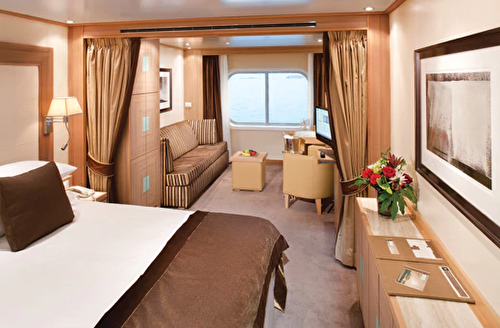
Located on Deck 4; Approximately 295 square feet (28 square meters) of inside space All Ocean View Suites feature: A large picture window Comfortable living area Queen-size bed or two twin beds Dining table for two Walk-in closet Interactive flat-screen television with music and movies. Fully stocked bar and refrigerator Makeup vanity Spacious bathroom with separate tub and shower
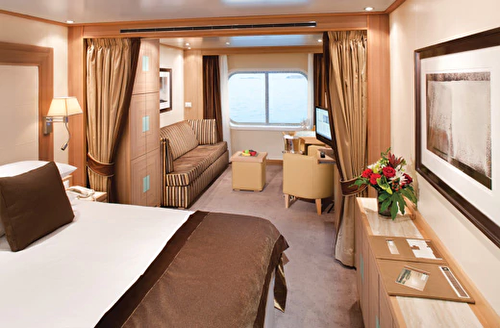
Approximately 295 square feet (28 square meters) of inside space For this option we select the location and specific suite for you, and notify you prior to departure. Guests are guaranteed to be assigned a suite in the category selected or higher. All Ocean View Suites feature a large picture window, comfortable living area, queen-size bed or two twin beds, dining table for two, walk-in closet, interactive flat-screen television with music and movies, fully stocked bar and refrigerator, makeup vanity, spacious bathroom with separate tub and shower.
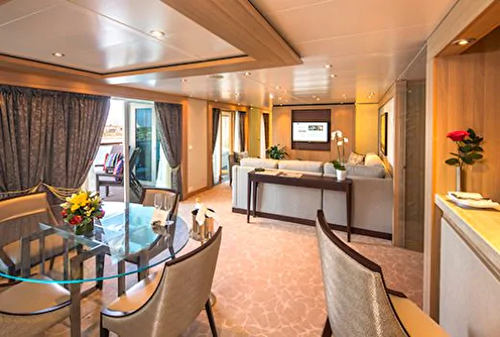
Approximately 1189 square feet (110 square meters) of inside space, plus two verandas totaling 214 square feet (20 square meters) Grand Wintergarden Suites feature Large windows Dining for six Glass-enclosed solarium with tub and day bed Two bedrooms Two bathrooms (one whirlpool) Guest bath Convertible sofa bed for one Pantry with wet bar Three flat-screen TVs Complimentary internet/Wi-Fi service
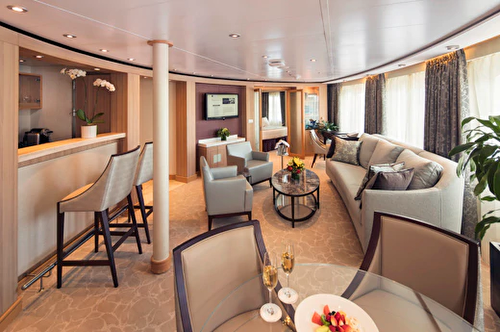
Approximately 526 & 593 square feet (49 to 55 square meters) of inside space, plus one veranda of 133 & 354 square feet (12 to 33 square meters) Owner's Suites feature: Expansive ocean views Forward-facing windows Dining for four to six Bathroom with whirlpool bathtub Guest bath Pantry with wet bar Two flat-screen TVs Complimentary Internet/Wi-Fi service

Approximately 526 & 593 square feet (49 to 55 square meters) of inside space, plus one veranda of 133 & 354 square feet (12 to 33 square meters) Owner's Suites feature: Expansive ocean views Forward-facing windows Dining for four to six Bathroom with whirlpool bathtub Guest bath Pantry with wet bar Two flat-screen TVs Complimentary Internet/Wi-Fi service
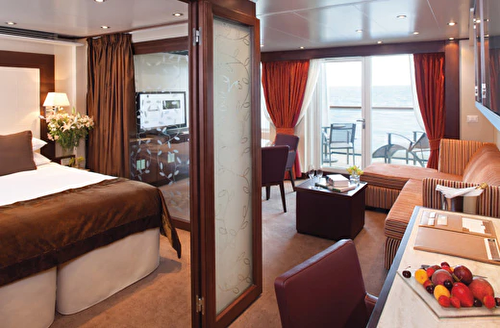
Penthouse Suite Approximately 436 square feet (41 square meters) of inside space, plus one veranda of 98 square feet (9 square meters) All Penthouse Suite feature: Dining table for two to four Separate bedroom Glass door to veranda Two flat-screen TVs Fully stocked bar Spacious bathroom with tub, shower and large vanity.
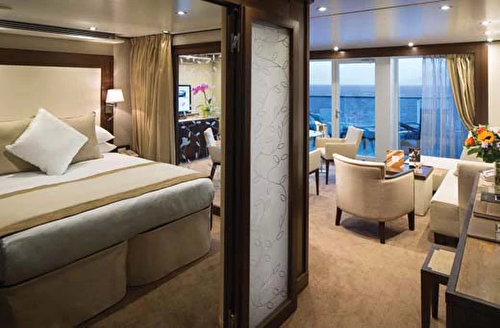
Penthouse Spa Suite Approximately 536 to 539 square feet (50 square meters) of inside space, plus one veranda of 167 to 200 square feet (16 to 19 square meters) All Penthouse Spa Suite feature: Dining table for two to four Separate bedroom Glass door to veranda Two flat-screen TVs Fully stocked bar Spacious bathroom with tub, shower and large vanity.
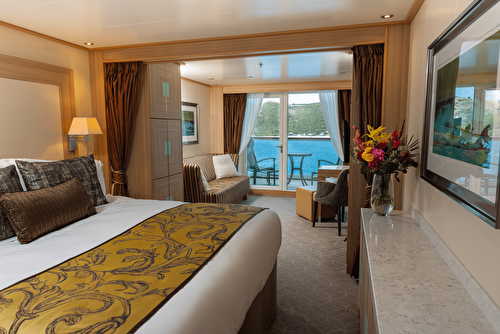
Veranda Suite Guarantee
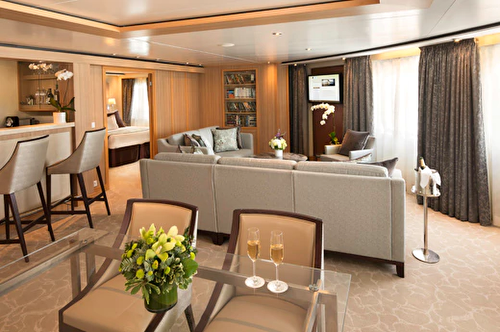
Signature Suite Approximately 859 square feet (80 square meters) of inside space, plus one veranda of 493 square feet (46 square meters) Signature Suites feature: Expansive ocean views Forward-facing windows Dining for four to six Bathroom with whirlpool bathtub Guest bath Pantry with wet bar Two flat-screen TVs Complimentary Internet/Wi-Fi service
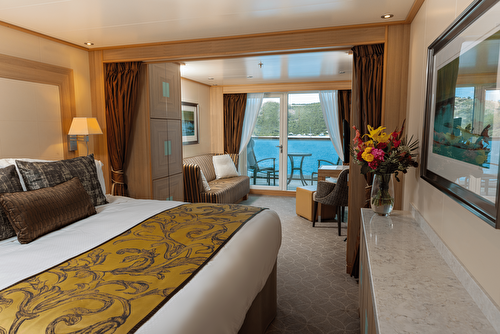
Located on Deck 5; Approximately 300 square feet (28 square meters) of inside space, plus one veranda of 65 square feet (6 square meters) All Veranda Suites feature: A full-length window and glass door to private veranda Comfortable living area Queen-size bed or two twin beds Dining table for two Walk-in closet Interactive flat-screen television with music and movies Fully stocked bar and refrigerator Makeup vanity Spacious bathroom with separate tub and shower.
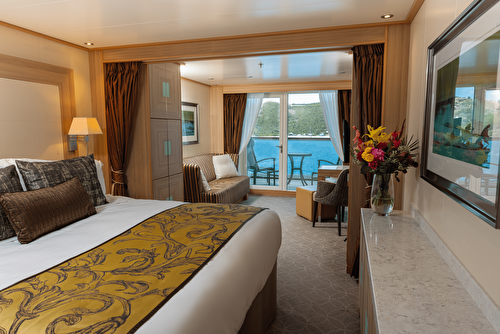
Located on Deck 5; Approximately 300 square feet (28 square meters) of inside space, plus one veranda of 65 square feet (6 square meters) All Veranda Suites feature: A full-length window and glass door to private veranda Comfortable living area Queen-size bed or two twin beds Dining table for two Walk-in closet Interactive flat-screen television with music and movies Fully stocked bar and refrigerator Makeup vanity Spacious bathroom with separate tub and shower.
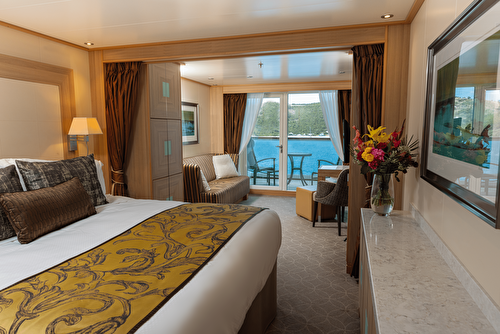
Located on Deck 6; Approximately 300 square feet (28 square meters) of inside space, plus one veranda of 65 square feet (6 square meters) All Veranda Suites feature: A full-length window and glass door to private veranda Comfortable living area Queen-size bed or two twin beds Dining table for two Walk-in closet Interactive flat-screen television with music and movies Fully stocked bar and refrigerator Makeup vanity Spacious bathroom with separate tub and shower.
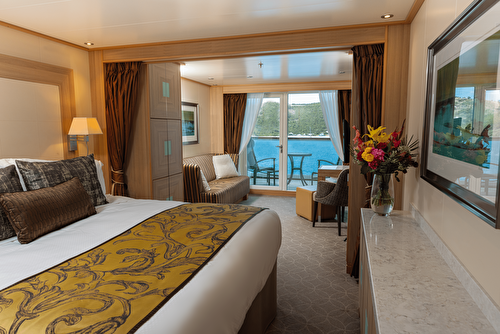
Located on Deck 7; Approximately 300 square feet (28 square meters) of inside space, plus one veranda of 65 square feet (6 square meters) All Veranda Suites feature: A full-length window and glass door to private veranda Comfortable living area Queen-size bed or two twin beds Dining table for two Walk-in closet Interactive flat-screen television with music and movies Fully stocked bar and refrigerator Makeup vanity Spacious bathroom with separate tub and shower
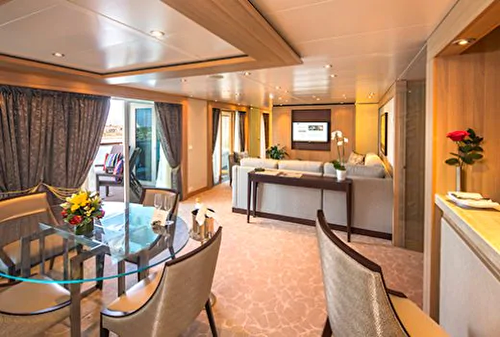
Approximately 914 square feet (85 square meters) of inside space, one veranda of 183 sq. ft. (17 square meters.). Wintergarden Suites feature Large windows Dining for six Whirlpool bathtub Guest bath Convertible sofa bed for one Pantry with wet bar Glass-enclosed solarium with tub and day bed Two closets Two flat-screen TVs Complimentary Internet/Wi-Fi service
Seabourn Quest is the third iteration of the vessel design that has been called “a game-changer for the luxury segment.” True to her Seabourn bloodlines, wherever she sails around the world, Seabourn Quest carries with her a bevy of award-winning dining venues that are comparable to the finest restaurants to be found anywhere. Seabourn Quest offers a variety of dining options to suit every taste and every mood, with never an extra charge.

Located on Deck 4; Approximately 295 square feet (28 square meters) of inside space All Ocean View Suites feature: A large picture window Comfortable living area Queen-size bed or two twin beds Dining table for two Walk-in closet Interactive flat-screen television with music and movies. Fully stocked bar and refrigerator Makeup vanity Spacious bathroom with separate tub and shower

Approximately 295 square feet (28 square meters) of inside space For this option we select the location and specific suite for you, and notify you prior to departure. Guests are guaranteed to be assigned a suite in the category selected or higher. All Ocean View Suites feature a large picture window, comfortable living area, queen-size bed or two twin beds, dining table for two, walk-in closet, interactive flat-screen television with music and movies, fully stocked bar and refrigerator, makeup vanity, spacious bathroom with separate tub and shower.

Approximately 1189 square feet (110 square meters) of inside space, plus two verandas totaling 214 square feet (20 square meters) Grand Wintergarden Suites feature Large windows Dining for six Glass-enclosed solarium with tub and day bed Two bedrooms Two bathrooms (one whirlpool) Guest bath Convertible sofa bed for one Pantry with wet bar Three flat-screen TVs Complimentary internet/Wi-Fi service

Approximately 526 & 593 square feet (49 to 55 square meters) of inside space, plus one veranda of 133 & 354 square feet (12 to 33 square meters) Owner's Suites feature: Expansive ocean views Forward-facing windows Dining for four to six Bathroom with whirlpool bathtub Guest bath Pantry with wet bar Two flat-screen TVs Complimentary Internet/Wi-Fi service

Approximately 526 & 593 square feet (49 to 55 square meters) of inside space, plus one veranda of 133 & 354 square feet (12 to 33 square meters) Owner's Suites feature: Expansive ocean views Forward-facing windows Dining for four to six Bathroom with whirlpool bathtub Guest bath Pantry with wet bar Two flat-screen TVs Complimentary Internet/Wi-Fi service

Penthouse Suite Approximately 436 square feet (41 square meters) of inside space, plus one veranda of 98 square feet (9 square meters) All Penthouse Suite feature: Dining table for two to four Separate bedroom Glass door to veranda Two flat-screen TVs Fully stocked bar Spacious bathroom with tub, shower and large vanity.

Penthouse Spa Suite Approximately 536 to 539 square feet (50 square meters) of inside space, plus one veranda of 167 to 200 square feet (16 to 19 square meters) All Penthouse Spa Suite feature: Dining table for two to four Separate bedroom Glass door to veranda Two flat-screen TVs Fully stocked bar Spacious bathroom with tub, shower and large vanity.

Veranda Suite Guarantee

Signature Suite Approximately 859 square feet (80 square meters) of inside space, plus one veranda of 493 square feet (46 square meters) Signature Suites feature: Expansive ocean views Forward-facing windows Dining for four to six Bathroom with whirlpool bathtub Guest bath Pantry with wet bar Two flat-screen TVs Complimentary Internet/Wi-Fi service

Located on Deck 5; Approximately 300 square feet (28 square meters) of inside space, plus one veranda of 65 square feet (6 square meters) All Veranda Suites feature: A full-length window and glass door to private veranda Comfortable living area Queen-size bed or two twin beds Dining table for two Walk-in closet Interactive flat-screen television with music and movies Fully stocked bar and refrigerator Makeup vanity Spacious bathroom with separate tub and shower.

Located on Deck 5; Approximately 300 square feet (28 square meters) of inside space, plus one veranda of 65 square feet (6 square meters) All Veranda Suites feature: A full-length window and glass door to private veranda Comfortable living area Queen-size bed or two twin beds Dining table for two Walk-in closet Interactive flat-screen television with music and movies Fully stocked bar and refrigerator Makeup vanity Spacious bathroom with separate tub and shower.

Located on Deck 6; Approximately 300 square feet (28 square meters) of inside space, plus one veranda of 65 square feet (6 square meters) All Veranda Suites feature: A full-length window and glass door to private veranda Comfortable living area Queen-size bed or two twin beds Dining table for two Walk-in closet Interactive flat-screen television with music and movies Fully stocked bar and refrigerator Makeup vanity Spacious bathroom with separate tub and shower.

Located on Deck 7; Approximately 300 square feet (28 square meters) of inside space, plus one veranda of 65 square feet (6 square meters) All Veranda Suites feature: A full-length window and glass door to private veranda Comfortable living area Queen-size bed or two twin beds Dining table for two Walk-in closet Interactive flat-screen television with music and movies Fully stocked bar and refrigerator Makeup vanity Spacious bathroom with separate tub and shower

Approximately 914 square feet (85 square meters) of inside space, one veranda of 183 sq. ft. (17 square meters.). Wintergarden Suites feature Large windows Dining for six Whirlpool bathtub Guest bath Convertible sofa bed for one Pantry with wet bar Glass-enclosed solarium with tub and day bed Two closets Two flat-screen TVs Complimentary Internet/Wi-Fi service
Included Services
Golf Leaf service included on Rocky Mountaineer
Pre cruise and train Transfers
Hotel Stays in Banff, Kamloops and Vancouver
Luxury Cruise onboard Seabourn for 14 nights.

2 days train included onboard the Rocky Mountaineer from Banff to Vancouver. Gold Leaf Service.

Transfers included from Train to Hotels and to the Port.

1 night pre stay in Banff, 1 night in Kamloops and 1 night in Vancouver.